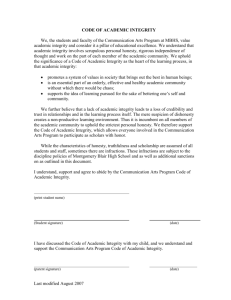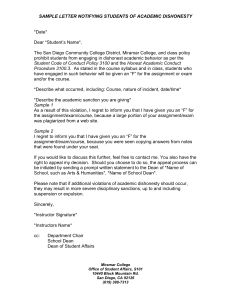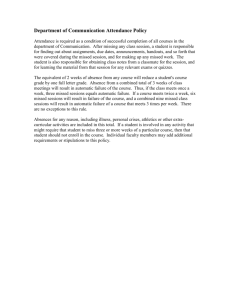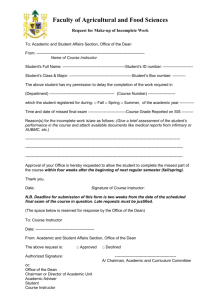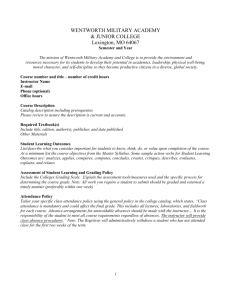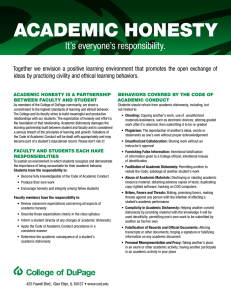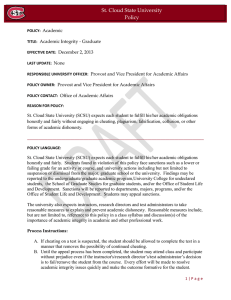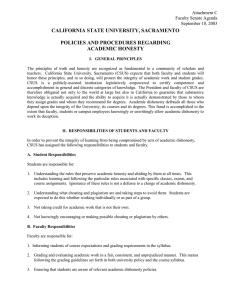Academic Honesty - San Diego Miramar College
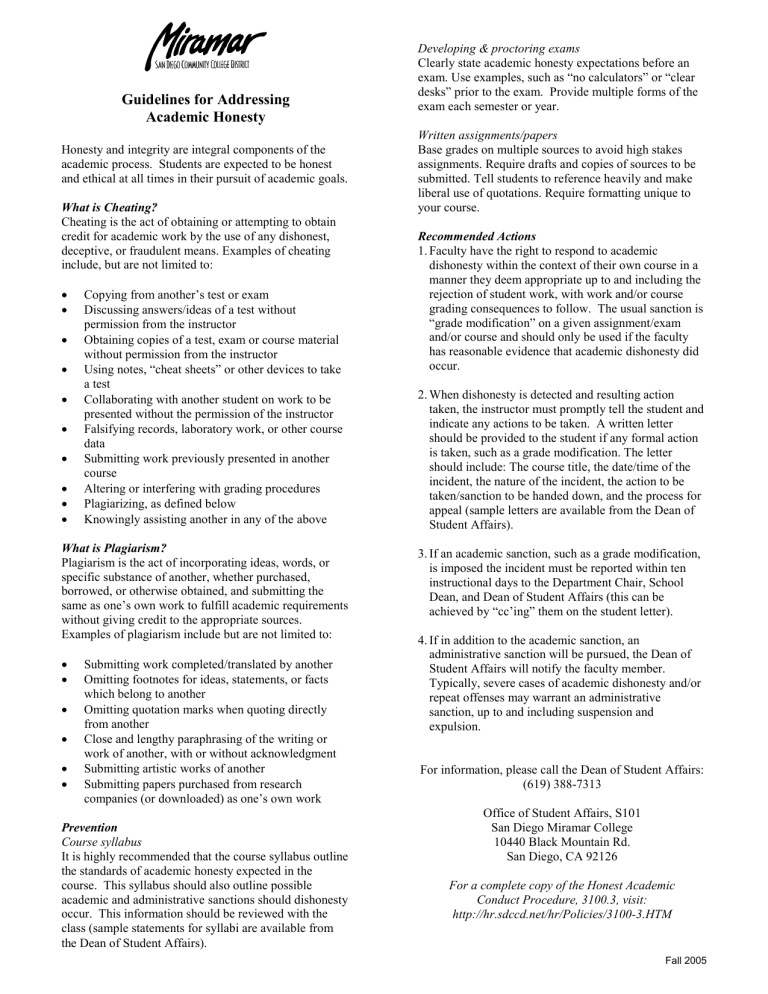
Guidelines for Addressing
Academic Honesty
Honesty and integrity are integral components of the academic process. Students are expected to be honest and ethical at all times in their pursuit of academic goals.
What is Cheating?
Cheating is the act of obtaining or attempting to obtain credit for academic work by the use of any dishonest, deceptive, or fraudulent means. Examples of cheating include, but are not limited to:
Copying from another’s test or exam
Discussing answers/ideas of a test without permission from the instructor
Obtaining copies of a test, exam or course material without permission from the instructor
Using notes, “cheat sheets” or other devices to take a test
Collaborating with another student on work to be presented without the permission of the instructor
Falsifying records, laboratory work, or other course data
Submitting work previously presented in another course
Altering or interfering with grading procedures
Plagiarizing, as defined below
Knowingly assisting another in any of the above
What is Plagiarism?
Plagiarism is the act of incorporating ideas, words, or specific substance of another, whether purchased, borrowed, or otherwise obtained, and submitting the same as one’s own work to fulfill academic requirements without giving credit to the appropriate sources.
Examples of plagiarism include but are not limited to:
Submitting work completed/translated by another
Omitting footnotes for ideas, statements, or facts which belong to another
Omitting quotation marks when quoting directly from another
Close and lengthy paraphrasing of the writing or work of another, with or without acknowledgment
Submitting artistic works of another
Submitting papers purchased from research companies (or downloaded) as one’s own work
Prevention
Course syllabus
It is highly recommended that the course syllabus outline the standards of academic honesty expected in the course. This syllabus should also outline possible academic and administrative sanctions should dishonesty occur. This information should be reviewed with the class (sample statements for syllabi are available from the Dean of Student Affairs).
Developing & proctoring exams
Clearly state academic honesty expectations before an exam. Use examples, such as “no calculators” or “clear desks” prior to the exam. Provide multiple forms of the exam each semester or year.
Written assignments/papers
Base grades on multiple sources to avoid high stakes assignments. Require drafts and copies of sources to be submitted. Tell students to reference heavily and make liberal use of quotations. Require formatting unique to your course.
Recommended Actions
1. Faculty have the right to respond to academic dishonesty within the context of their own course in a manner they deem appropriate up to and including the rejection of student work, with work and/or course grading consequences to follow. The usual sanction is
“grade modification” on a given assignment/exam and/or course and should only be used if the faculty has reasonable evidence that academic dishonesty did occur.
2. When dishonesty is detected and resulting action taken, the instructor must promptly tell the student and indicate any actions to be taken. A written letter should be provided to the student if any formal action is taken, such as a grade modification. The letter should include: The course title, the date/time of the incident, the nature of the incident, the action to be taken/sanction to be handed down, and the process for appeal (sample letters are available from the Dean of
Student Affairs).
3. If an academic sanction, such as a grade modification, is imposed the incident must be reported within ten instructional days to the Department Chair, School
Dean, and Dean of Student Affairs (this can be achieved by “cc’ing” them on the student letter).
4. If in addition to the academic sanction, an administrative sanction will be pursued, the Dean of
Student Affairs will notify the faculty member.
Typically, severe cases of academic dishonesty and/or repeat offenses may warrant an administrative sanction, up to and including suspension and expulsion.
For information, please call the Dean of Student Affairs:
(619) 388-7313
Office of Student Affairs, S101
San Diego Miramar College
10440 Black Mountain Rd.
San Diego, CA 92126
For a complete copy of the Honest Academic
Conduct Procedure, 3100.3, visit: http://hr.sdccd.net/hr/Policies/3100-3.HTM
Fall 2005
